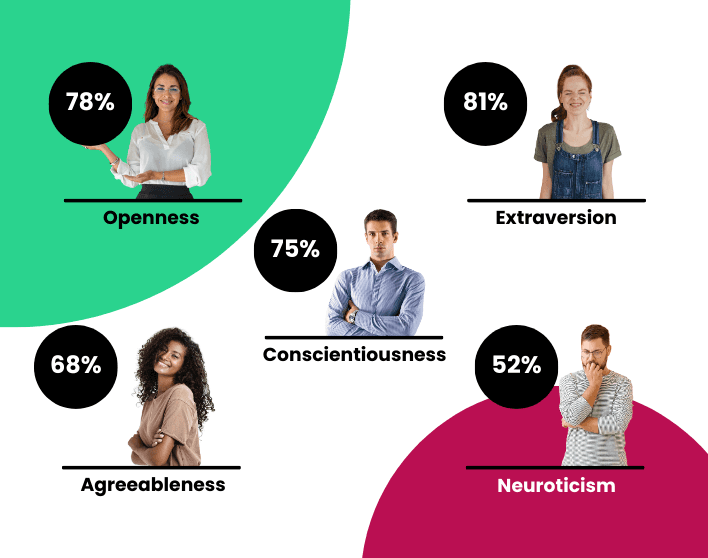The Bryq Team
HR Experts
Leonardo di Vinci wrote the first professional resume in 1482. On a piece of parchment, he listed some of the brilliant inventions he created and spoke about some of his innovative skill sets. Since then, the format of the resume has changed drastically, and so has the way we look over them. In the modern age, we even have resume-screening computer software that scans resumes for information! Despite the many changes that the resume has undergone, there are many things that haven’t really changed at all. Resumes continue to be poor indicators of job performance and contain unreliable information about job candidates.
So why is this seriously flawed system still so popular amongst so many companies, large and small? There are better options out there to aid employers in finding the right candidates. These alternatives are much more accurate in predicting job performance and fit. In this blog, we explain why resume-scanning is ruining your hiring process, and help you discover what you can do about it.
Resumes Are Unreliable
Not only is resume-screening software super problematic, but the “data” they’re scanning is flawed. Resume-screening forces candidates to lie about their past work experience, leading to resumes full of inaccuracies. There are three main reasons why resume-screening is wrong.
Reason #1: Resumes Are Inaccurate
Resumes are simply not accurate. Studies show that more and more people are lying about their past work experience to get a job. In fact, about 85% of job seekers are being dishonest when typing out their resumes! This might seem like a shocking number to read, but the current resume-scanning system encourages job hopefuls to be deceitful. Candidates know that they won’t even score an initial interview if they don’t have the right job titles or have gaps in employment, however justified.
Candidates may lie about everything from work experience, years worked, education, their references - even their names! With so many candidates feeling the pressure to fudge the truth to get the job, resumes really aren’t a great way to source candidates. There’s no real way of knowing or proving that the information you’re seeing to make that initial interview is true. Resumes are bad data points. You’re simply taking the word of a stranger who is doing their best to put their best foot forward. However, we can’t blame candidates - this outdated system forces them to do this.
Reason #2: Resumes Are Not Good Indicators of Future Performance
When searching for new hires, the vast majority of employers list “past experience” in their job descriptions as either a requirement or something that is strongly preferred in a job candidate. This obviously leaves recent graduates and candidates looking to start a new career path at an obvious disadvantage. Despite this requirement being so popular amongst hiring managers, the truth is that there isn’t much evidence to back up this desire. Research shows that while 82% of employers require or prefer past job experience, there is no correlation between experience and future job performance. This prerequisite is not only unfair to job candidates, but it’s not going to help you hire the best candidate in your talent pool. All of the time you’re wasting on resume experience isn’t amounting to much - and the numbers prove this.
Reason #3: Resumes Lead to Bias
Everybody has bias - whether we want to admit it or not. Unconscious bias remains a huge problem in the recruitment industry. Resume-screening just adds fire to the flames of the problem. Job hopefuls are discriminated against every day - for being women, for being gay, for being black. Research shows that black and Asian job candidates who “whiten” their resumes to hide their true race are more successful in finding a job. Women may change or shorten their name to appear more adrogynous. (Example: an ‘Alexandria’ may shorten her name to something more gender-neutral like ‘Alex’ to score a job interview.) Candidates who have more ethnic-sounding last names might be tempted to change their last name to something more caucasian-sounding. The list goes on and on…
Why do candidates do this? Because the research shows that bias still happens in 2021. Resumes just lead to solidifying it. Remember that not all bias is necessarily “bad”. For example, if a hiring manager went to Harvard University, they may have what we call an ‘affinity bias’ towards job candidates who also attended Harvard. On that note, hiring managers may always take a Harvard graduate over somebody who attended a school that wasn’t as prestigious. By looking at a resume and being able to initially see a candidate’s secondary education and assume their gender or race, you are opening up a Pandora’s Box to a terrifying bout of bias in your hiring process. Nobody benefits from this - not you, and definitely not job candidates.
Bryq Breaks the Resume-Screening Cycle
It’s clear that resume-screening is problematic in more ways than one. Resumes are easily manipulated, they run on unreliable data, they lead to bias, and above all else - they are unfair to job candidates. Resume-parsing technology does not lead to innovation or better culture. It only leads you around in the same hiring circle again and again.
When we began Bryq, our mission was clear - eliminate bias from the hiring process. Through our talent management software, we’ve made it possible for hiring managers and recruiters everywhere to hire not based on work experience or secondary education - but based on merit and who candidates are. Our talent assessments help hiring managers find the best matches within their talent pools based on our I-O psychology. We assess job hopefuls by personality traits and measuring their cognitive abilities through cognitive skill tests. This allows us to not only see which candidates will best fit into your work environment and add to your company’s culture, but it also allows us to predict which candidates will perform the best in the role. We don’t base our hiring suggestions on unreliable data points, we base them on science.
If you want to phase out resume-scanning and start hiring surefire candidates, why not try Bryq on for size? Our free 7-day trial makes it easy for companies to see for themselves how well this system works. You can also request a demo with the Bryq Customer Success Team if you’d like us to show you how it’s all done. The choice is yours. Join us in the future of hiring now!









